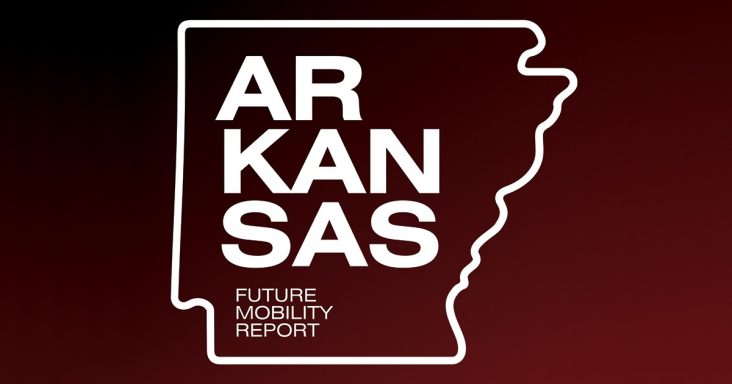Governor’s future mobility council submits recommendations
by December 8, 2022 2:52 pm 1,902 views

On Thursday (Dec. 8), Gov. Asa Hutchinson discussed a new report with recommendations to boost Arkansas’ future mobility sector.
The Arkansas Council on Future Mobility presented its report to Hutchinson during a press conference at the State Capitol in Little Rock. With an executive order, Hutchinson announced the council’s formation in February while hosting an event at the governor’s mansion to highlight aspects of the burgeoning industry.
“We appreciate your trust and look forward to seeing these [recommendations] turned into action,” Cyrus Sigari, the advisory group’s chairman, said when he presented the governor with the 90-page report.
“It’s heavy,” the governor joked.
Sigari, an aviator, entrepreneur and investor, headed up the council with 26 advisory and 18 appointed members. They are private investors, government and public utility administrators, academic experts and corporate leaders from numerous companies, including DroneUp, Entegrity, Garver, Gatik, J.B. Hunt Transport Services, Runway Group, Skyports, Tulsa Innovation Labs, Tyson Foods, Union Pacific, UP.Partners, Walmart Inc. and Zipline.
The council’s five main objectives were:
- Identify state laws and administrative rules that create barriers to the development and enhancement of electrification and advanced air mobility (AAM)
- Make policy and program recommendations to support and facilitate the development of electrification and AAM
- Develop priorities and recommendations for the allocation of federal resources and grant programs to invest in critical components of an advanced mobility ecosystem, including energy, infrastructure, security, and transportation
- Identify future tasks and goals, including strategic goals in education, workforce training, and economic development
- Create incentives to develop opportunities, amplify economic activity, and create jobs.
“Arkansas has such a rich history in which entrepreneurial spirit, tremendous work ethic, and cutting-edge innovation have all blended to produce some of the most successful corporations and organizations in the world,” said Sigari, managing partner of UP.Partners, an early-stage venture capital firm in California that invests in technology companies supporting AAM and electric vertical take-off and landing (eVTOL) aircraft industries. “These same values, along with the support of investors, corporate leaders, the general public, and state policy-makers have made the state well-positioned to be the world’s foremost producer of future mobility technology.”
The governor said the report is invaluable and can serve as a blueprint for how the state can become the global leader in the future of transportation for next-generation technology by 2030.
“It also reinforces that we need to take a thoughtful, strategic approach to grow this industry,” Hutchinson said. “This growth will not come by accident, and there are no do-overs. My fellow Arkansans and I are extremely grateful for the council’s intensive work that will pay dividends for generations to come.”
For a PDF of the council’s report, click here. It is touted as a statewide playbook to address the rapidly changing future of moving people and goods on the ground, air, sea and space.
Included are several specific recommendations in six areas: investment, workforce and academic development, organizational infrastructure, events, community and storytelling, cross-state initiatives and crafting a comprehensive AAM policy.
One of the report’s recommendations underscores the importance of cooperation with other states — especially with border states.
In March, Hutchinson entered Arkansas into a bipartisan three-state partnership with Oklahoma and Louisiana to compete for the $7 billion available through the Department of Energy’s Infrastructure, Investment and Jobs Act of 2021.
In August, the governor signed a memorandum of understanding with Oklahoma Gov. Kevin Stitt to establish the “Advanced Mobility Corridor.”
The council said an opportunity exists to partner with other neighboring states (Tennessee and Texas) in addition to Oklahoma to form a super mobility region in the heartland.
Hutchinson also noted other recommendations that caught his attention. He said Arkansas could learn from the success of places like Israel, which annually spends over half a billion dollars to support local technology by investing in startups.
Similarly, the council recommended creating a $250 million Arkansas Innovation Fund (AIF) to invest in emerging companies. The fund would focus on investing in tech companies that are in Arkansas, especially in emerging technology and advanced mobility. It would be funded with $125 million from the government surplus and $125 million as a dollar-for-dollar match from the state-controlled pensions or the balance sheets of the state’s largest companies.
The governor also noted specific recommendations to strengthen workforce training and education tailored to the defense industry. The council proposed legislation to create a Center of Excellence (COE) for Aerospace, Defense, and Advanced Mobility, which would serve as a broker between the education sector and the mobility industry to bring more job opportunities to Arkansas and ensure a ready A&D workforce.
“These recommendations are bold, visionary and specific ideas for the future,” Hutchinson said. “But some are aspirational, and we need to be aspirational in our state as we look to the future.”
The council’s report said lawmakers and local municipal officials all have a role to play in ensuring the success of advanced mobility. Several state legislators attended Thursday’s news conference, and the governor challenged them to receive the report enthusiastically.
“There are some bold ideas here [and] I hope you will embrace them,” he said. “It’s up to you. You carry the ball now. We hope you will receive this report with some enthusiasm and with a look to the future to say this is what Arkansas can be and what we can lead in.”
